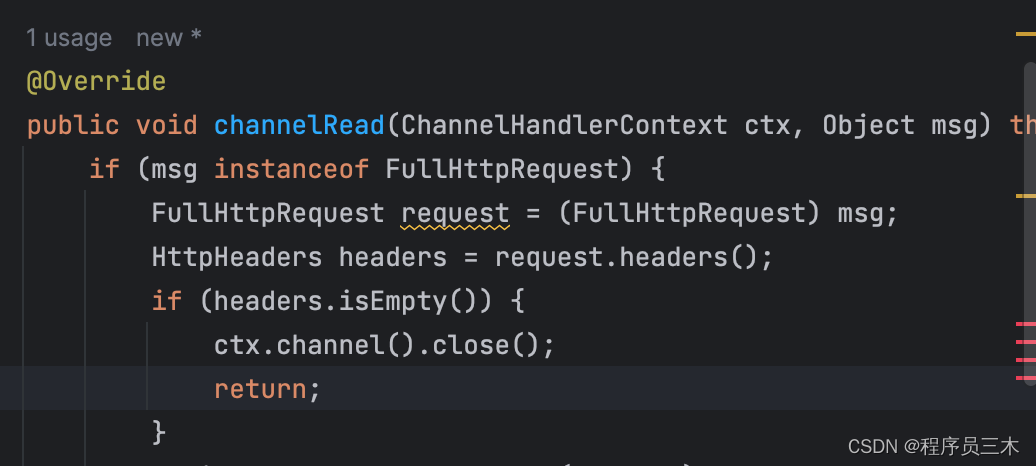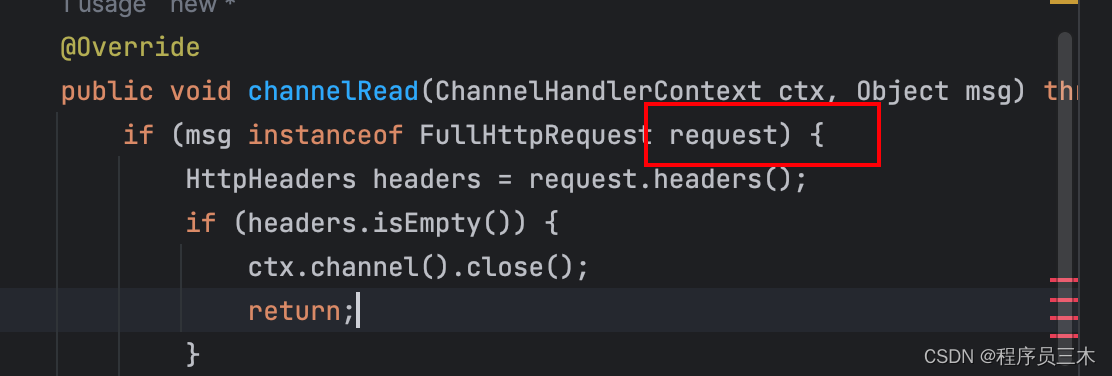缘起
起初是在项目中写了一段代码报了黄线
if (msg instanceof FullHttpRequest) {
FullHttpRequest request = (FullHttpRequest) msg;
HttpHeaders headers = request.headers();
if (headers.isEmpty()) {
ctx.channel().close();
return;
}
...
}

这看到黄线,不能忍啊,点一下哎

不点不知道,点了一下,咦代码确实变好看了一点,就知道刚学学新技术了~
探寻
Pattern matching involves testing whether an object has a particular structure, then extracting data from that object if there’s a match. You can already do this with Java; however, pattern matching introduces new language enhancements that enable you to conditionally extract data from objects with code that’s more concise and robust.
模式匹配包括测试对象是否具有特定的结构,如果存在匹配,则从该对象中提取数据。你已经可以用Java做到这一点。但是,模式匹配引入了新的语言增强功能,使您能够有条件地使用更简洁和健壮的代码从对象中提取数据。
Pattern Matching for the instanceof Operator
Enhance the Java programming language with pattern matching for the
instanceofoperator. Pattern matching allows common logic in a program, namely the conditional extraction of components from objects, to be expressed more concisely and safely.
使用instanceof操作符的模式匹配增强Java编程语言。模式匹配允许程序中的公共逻辑,即从对象中有条件地提取组件,以更简洁和安全的方式表达。
为什么引入
在项目开发过程中,我们经常会写以下类似代码,臃肿而难看。这段代码主要是进行类型判断,然后进行类型转换。
if (obj instanceof String) {
String s = (String) obj; // grr...
...
}
- 引入模版变量之后
A pattern is a combination of (1) a predicate, or test, that can be applied to a target, and (2) a set of local variables, known as pattern variables, that are extracted from the target only if the predicate successfully applies to it.
A type pattern consists of a predicate that specifies a type, along with a single pattern variable.
The
instanceofoperator (JLS 15.20.2) is extended to take a type pattern instead of just a type.
模式是(1)可以应用于目标的谓词或测试,以及(2)一组称为模式变量的局部变量的组合,只有当谓词成功地应用于目标时,这些局部变量才会从目标中提取出来。
类型模式由指定类型的谓词和单个模式变量组成。
instanceof操作符(JLS 15.20.2)被扩展为接受类型模式而不仅仅是类型。
if (obj instanceof String s) {
// Let pattern matching do the work!
...
}
(In this code, the phrase
String sis the type pattern.) The meaning is intuitive. Theinstanceofoperator matches the targetobjto the type pattern as follows: Ifobjis an instance ofString, then it is cast toStringand the value is assigned to the variables.
Rather than using a coarse approximation for the scope of pattern variables, pattern variables instead use the concept of flow scoping. A pattern variable is only in scope where the compiler can deduce that the pattern has definitely matched and the variable will have been assigned a value. This analysis is flow sensitive and works in a similar way to existing flow analyses such as definite assignment.
如果断言失败 obj 不是 String 则不会为 s 赋值。
纸上得来终觉浅
if (a instanceof Point p) {
// p is in scope
...
}
// p not in scope here
if (b instanceof Point p) {
// Sure!
...
}
if (obj instanceof String s && s.length() > 5) {
flag = s.contains("jdk");
}
if (obj instanceof String s || s.length() > 5) {
// Error!
...
}
使用模版变量重构 effective java部分例子
public final boolean equals(Object o) {
return (o instanceof CaseInsensitiveString)
&& ((CaseInsensitiveString) o).s.equalsIgnoreCase(s);
}
- 重构后
public final boolean equals(Object o) {
return (o instanceof CaseInsensitiveString cis)
&& cis.s.equalsIgnoreCase(s);
}
Pattern Matching for switch Expressions and Statements
概括
switch 通过表达式和语句的模式匹配以及模式语言的扩展来增强 Java 编程语言。扩展模式匹配switch允许针对多个模式测试表达式,每个模式都有一个特定的操作,以便可以简洁、安全地表达复杂的面向数据的查询。这是JDK 17 中的预览语言功能。
目标
switch通过允许模式出现在标签中来扩展表达式和语句的表现力和适用性case。switch在需要时允许放松历史上的零敌意。- 引入两种新的模式:受保护的模式,允许使用任意布尔表达式来细化模式匹配逻辑,以及 括号模式,以解决一些解析歧义。
- 确保所有现有
switch表达式和语句继续编译而不进行任何更改并以相同的语义执行。 - 不要引入
switch与传统switch构造分离的具有模式匹配语义的新的类似表达式或语句。 switch当 case 标签是模式时与 case 标签是传统常量时,不要使表达式或语句的行为有所不同。
直接看引入前后的对比
static String formatter(Object o) {
String formatted = "unknown";
if (o instanceof Integer i) {
formatted = String.format("int %d", i);
} else if (o instanceof Long l) {
formatted = String.format("long %d", l);
} else if (o instanceof Double d) {
formatted = String.format("double %f", d);
} else if (o instanceof String s) {
formatted = String.format("String %s", s);
}
return formatted;
}
- 引入
switch增强之后
static String formatterPatternSwitch(Object o) {
return switch (o) {
case Integer i -> String.format("int %d", i);
case Long l -> String.format("long %d", l);
case Double d -> String.format("double %f", d);
case String s -> String.format("String %s", s);
default -> o.toString();
};
}
jdk8
int dayOfWeek = 3;
String dayName;
switch (dayOfWeek) {
case 1:
dayName = "Monday";
break;
case 2:
dayName = "Tuesday";
break;
case 3:
dayName = "Wednesday";
break;
case 4:
dayName = "Thursday";
break;
case 5:
dayName = "Friday";
break;
case 6:
dayName = "Saturday";
break;
case 7:
dayName = "Sunday";
break;
default:
dayName = "Invalid day";
break;
}
System.out.println("Day of the week: " + dayName);
jdk17
int dayOfWeek = 3;
String dayName = switch (dayOfWeek) {
case 1 -> "Monday";
case 2 -> "Tuesday";
case 3 -> "Wednesday";
case 4 -> "Thursday";
case 5 -> "Friday";
case 6 -> "Saturday";
case 7 -> "Sunday";
default -> "Invalid day";
};
System.out.println("Day of the week: " + dayName);
总结
拥抱新技术,用就对了~